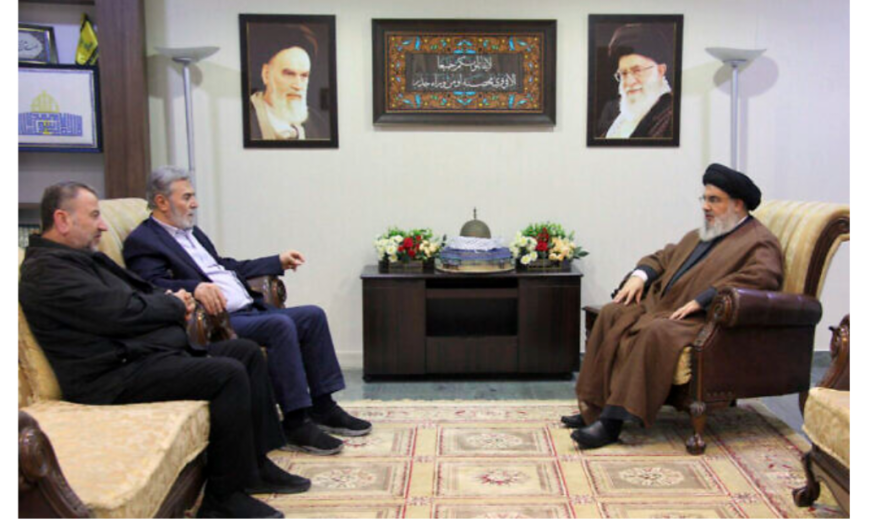In this photo released on Wednesday, Oct. 25, 2023, by the Hezbollah Media Relations Office, Hezbollah leader Hassan Nasrallah, right, meets with Ziad al-Nakhaleh, the head of Palestinian Islamic Jihad, center, and Hamas deputy chief, Saleh al-Arouri, in Beirut, Lebanon. (Hezbollah Media Relations.)
The leader of Lebanon’s Hezbollah held talks on Wednesday with senior Hamas and Palestinian Islamic Jihad figures in a key meeting of the region’s top three anti-Israel terror groups amid the war raging in Gaza, as cross-border fire with Israel continued.
A brief statement following the meeting said that Hezbollah’s leader Hassan Nasrallah agreed with Hamas’s Saleh al-Arouri and Islamic Jihad’s leader Ziad al-Nakhaleh on the next steps that the three — along with other Iran-backed, non-state actors — should take at this “sensitive stage.”
Nasrallah is known as a reclusive leader who rarely ventures beyond the confines of Hezbollah’s fortified zones in south Lebanon, where the Iranian-backed jihadi group has an extensive network of underground bunkers.
Their goal, according to the statement that was carried on Hezbollah-run and Lebanese state media, was to achieve “a real victory for the resistance in Gaza and Palestine” and halt Israel’s “treacherous and brutal aggression against our oppressed and steadfast people in Gaza and the West Bank.”
No other details were provided. The discussions in Beirut came as the war between Israel and Hamas, the Palestinian terrorist group that rules the Gaza Strip, is now in its third week.
On Wednesday, the IDF said it struck a terror cell in southern Lebanon that was preparing to carry out an attack, near the northern community of Zar’it.
The IDF said the cell was targeted with artillery shelling and a drone strike, noting that the terror cell was “attempting to open fire,” without specifying if it was trying to launch rockets, or missiles, or using light arms.
Shortly afterward, an anti-tank guided missile was launched at an Israeli tank operating on the Lebanon border, close to the northern community of Avivim, the IDF said.
There were no injuries in the attack, and the Israeli military said it responded with artillery shelling at the source of the missile fire.
Later Wednesday afternoon, four rockets were launched from Lebanon at the northern city of Kiryat Shmona, which has been largely evacuated. According to the IDF, all four landed in open areas, causing no injuries or damage.
The current conflict was triggered by Hamas’s brutal incursion into Israel on October 7 that killed more than 1,400 people in Israel. Hamas also took more than 200 hostages, including young children, women, and the elderly.
According to Hamas, Israel’s subsequent air campaign has since killed more than 6,000 Palestinians in Gaza. The numbers from the terror group cannot be independently verified and do not differentiate between combatants and civilians, and are also believed to include some 1,500 Hamas terrorists killed in Israel on and since October 7.
As the Gaza death toll spirals, tensions have also been rising along the tense Lebanon-Israel border, where Hezbollah gunmen have been exchanging fire with Israeli troops since the day after Hamas’s rampage in Israel.
For now, those exchanges remain limited to a handful of border towns and Hezbollah and Israeli military positions on both sides. Lebanese army soldiers and United Nations peacekeeping forces have deployed in large number but have not stopped Hezbollah from repeatedly firing on Israeli positions and communities. Israel has evacuated residents from locales closest to the border.
Dozens of Hezbollah fighters have been killed in the clashes so far, the group says, while the Israeli military has announced six soldiers and one civilian killed.
Nasrallah has yet to publicly speak about the war in Gaza and clashes along the Lebanon-Israel border. However, other Hezbollah top officials have warned Israel against its planned ground invasion in the Strip.
Israeli officials have said they would retaliate aggressively in case of a cross-border attack by Hezbollah from Lebanon.
“We will cripple it with a force it cannot even imagine, and the consequences for it and the Lebanese state [will be] devastating,” Prime Minister Benjamin Netanyahu said while visiting Israeli troops along the border with Lebanon on Sunday.
Washington has also issued repeated dire warnings against Hezbollah initiating a regional war, indicating the US could also get involved.
Lebanon’s cash-strapped caretaker government, along with regional and international figures, has been scrambling to keep the country out of the war. Hezbollah, both a terror group and a political party, holds great sway in Lebanese politics.
Hezbollah and Israel fought a monthlong war in 2006 that ended in a tense stalemate. Israel sees Iran-backed Hezbollah as its most serious threat, estimating it has some 150,000 rockets and missiles aimed at Israel.

A damaged IDF armored personnel carrier seen near the Lebanon border on October 25, 2023.

